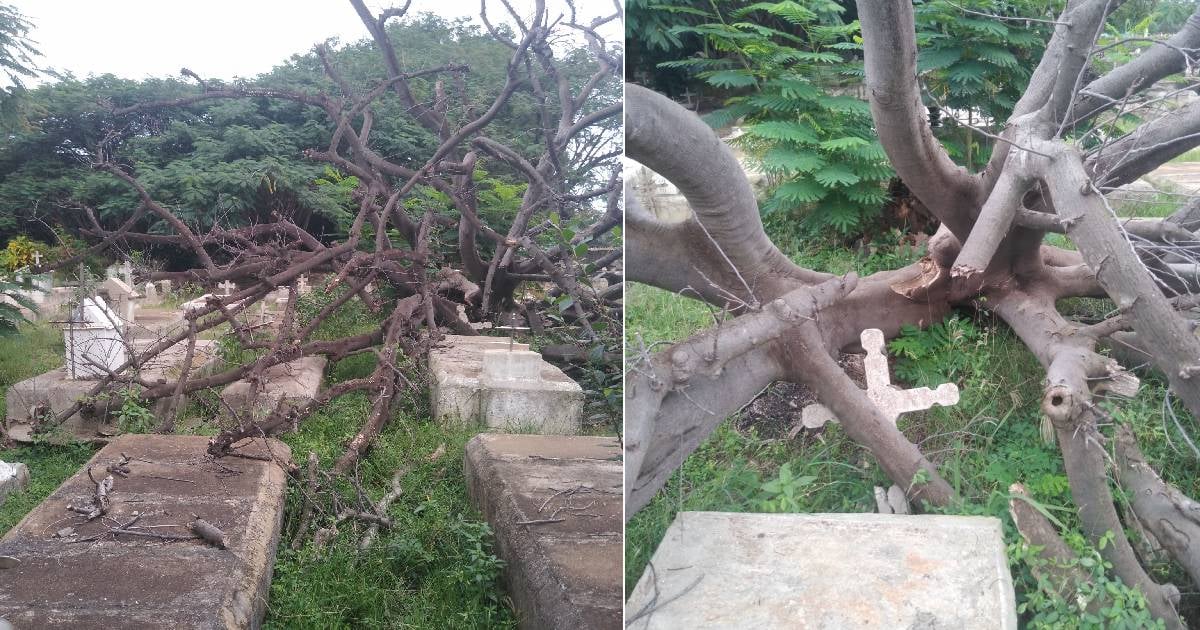
Related videos:
An unusual and distressing situation persists in the cemetery of the village of Felton in Holguín, where a fallen tree has been resting on several graves for over a month without local authorities taking action to remove it.
"This is the Felton cemetery, one of the few in Cuba that remains clean and organized, providing peace of mind for those of us who have our loved ones resting there," begins the post by Patricia Santiesteban Tamayo in the Facebook group "Revolico Felton."
According to the explanation, the tree remains over the graves due to the lack of staff to address the issue.
The complainant indicates that, following the transfer of management of the cemetery from Comunales to the Necrological Services company, maintenance has significantly deteriorated.
"There, no one works, only Ñeco, who is retired and ill, and he volunteers to help whenever he is called for a burial. He no longer has the strength for anything more," he pointed out.
The community has tried to find solutions on their own, but the burden of institutional neglect falls on them. "Whoever is interested in keeping this clean should just do it because no one else will do it for us. It's a reflection of what we experience in all areas. Nothing works anymore," Santiesteban concludes.
The situation was commented on by a user in the post itself, who stated: "If the living don't matter to them, imagine the dead," reflecting the outrage of Cuban society regarding the failures of their leaders to manage basic services on the island.
This situation is part of a broader context of neglect and disrespect towards cemeteries in Cuba, evident in numerous recent cases.
In Sancti Spíritus, in August of this year, reports emerged of thefts and desecrations of graves in the municipal cemetery, where criminals removed human remains for unknown purposes, leaving heartbreaking scenes for the affected families.
A month later, in September, the cemetery of Catalina de Lasa and Juan Pedro Baró in Havana was also desecrated, sparking a wave of outrage as the graves of historical and cultural figures were violated.
In November, images of the iconic Colón Cemetery in Havana revealed a bleak scene: skeletal remains and destroyed niches, along with deplorable conditions of neglect. Citizens reported a lack of security and maintenance in one of the island's most significant cemeteries.
Recently, in December, new cases of theft and desecration of niches were confirmed in various cemeteries across the country, highlighting the growing issue of insecurity and the government's lack of interest in preserving these sacred spaces.
In a country where material shortages are evident, cemeteries reflect a reality that impacts not only the living but also the memory and respect for those who are no longer here.
Frequently Asked Questions about Abandonment and Desecration in Cuban Cemeteries
Why has a tree been on graves in the cemetery of Felton, Holguín for over a month?
The tree remains over the graves due to a lack of personnel to address the issue. Since the cemetery's management changed to the company Servicios Necrológicos, maintenance has declined, and only a retired individual volunteers to assist, reflecting institutional neglect.
What is the general situation of cemeteries in Cuba?
Cemeteries in Cuba are facing widespread neglect, with frequent thefts and desecration of graves. This situation is attributed to a lack of resources, security, and maintenance from the government, impacting cemeteries across various regions of the country.
What responsibility does the Cuban government have regarding the state of the cemeteries?
The Cuban government bears direct responsibility for the neglected state of the cemeteries due to its inability to provide the necessary resources and implement effective measures for their maintenance and security. Citizens' complaints have been ignored, increasing the frustration of those affected.
How does the neglect of cemeteries affect Cuban families?
The neglect of cemeteries emotionally impacts families, who see the resting places of their loved ones compromised. Furthermore, they face logistical and financial obstacles for burials due to a lack of transportation and deteriorating infrastructure, which worsens their situation during times of mourning.
Filed under: